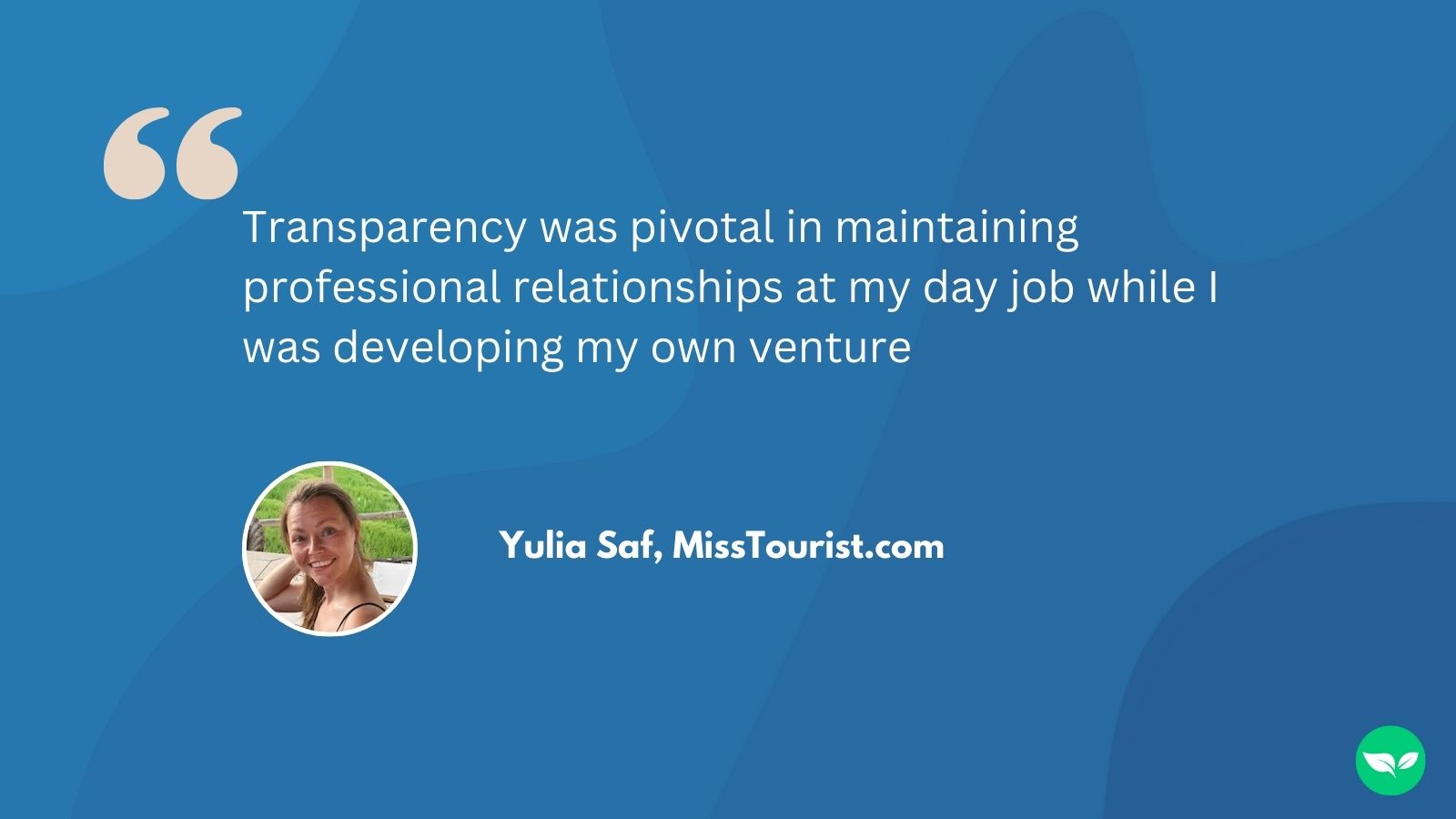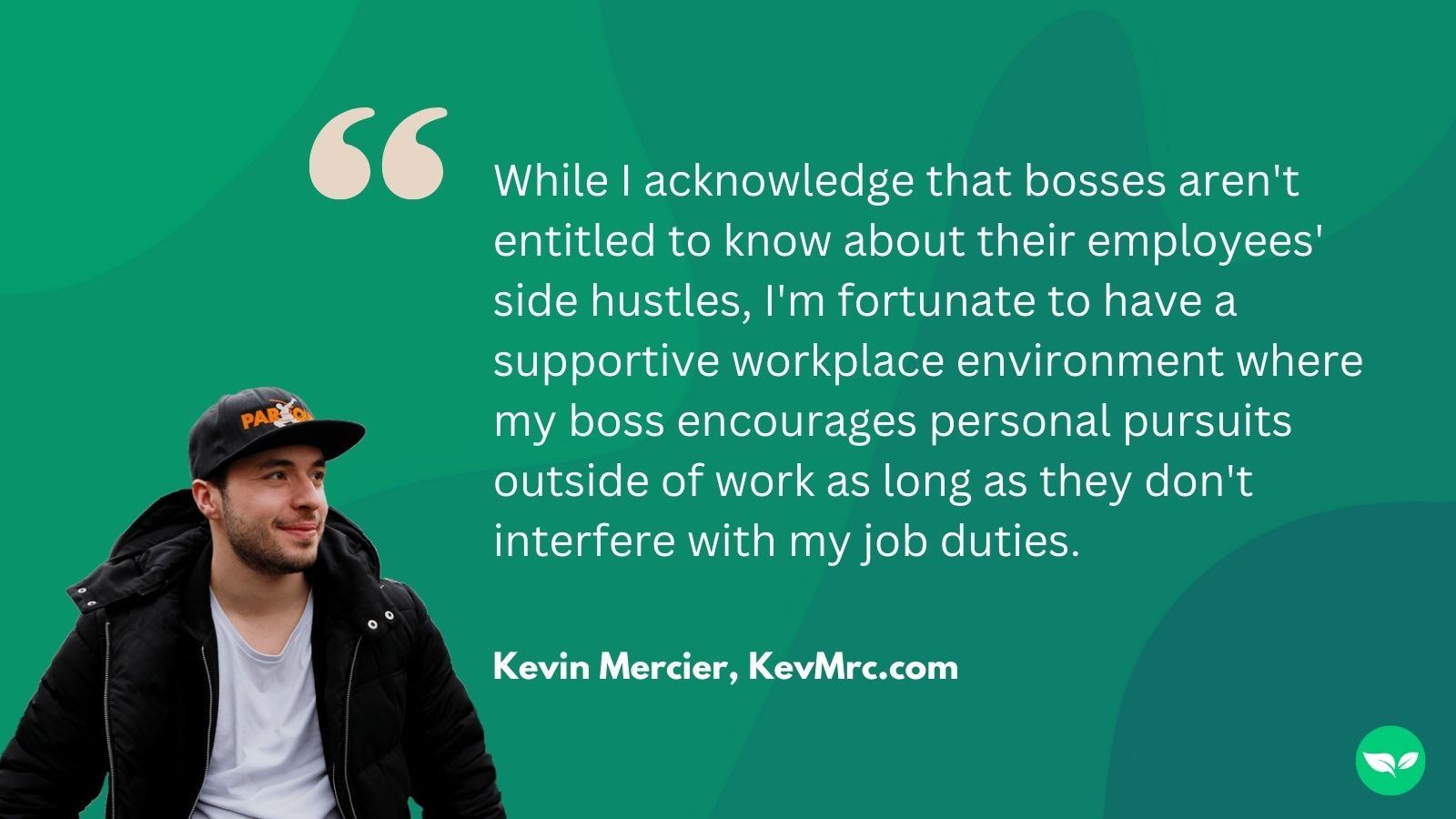Should I Tell My Boss About My Side Hustle? Here’s How to Decide
Telling your boss about a side hustle can have consequences beyond the workplace. Here are the pros and cons, and strategic advice for the conversation.

Imagine you’re in a typical Monday morning meeting, sipping your third cup of coffee, when your boss casually asks, “So, what did everyone do this weekend?”
Before you know it, you blurt out, “I onboarded 2 new clients for my fitness coaching business!” and suddenly, all eyes are on you—especially your boss’s. Oops.
In today’s gig-fueled economy, side hustles are more popular than ever. They’re a fantastic way to pad your wallet, pursue passions, or just get out from under the 9-to-5 grind for a few hours each week.
But this brings us to a modern workplace quandary: should you tell your boss about your side gig?
It’s a delicate dance between transparency and maintaining your professional image, and getting it right can feel as tricky as explaining TikTok to your grandparents.
Why You Might Want to Tell Your Boss
Diving into whether to share your side gig with your boss can feel like walking a tightrope. Let’s unpack the reasons why opening up might just be a step worth taking.
Transparency First
Yulia Saf was a full-time project manager when she first started her side hustle, a tourism blog called Miss Tourist. “Transparency was pivotal in maintaining professional relationships at my day job while I was developing my own venture,” Saf shares. “In many cases, an employer could immensely benefit from the diversified skill set an employee acquires balancing multiple roles.”
Remember, trust is a two-way street. Being upfront about your side hustle can build trust between you and your employer. It shows that you are honest and considerate of your workplace obligations – plus it can also prevent any misunderstandings about where your loyalties lie, especially if your side hustle activities ever impact your work schedule or performance.
Seeking Support
You might be surprised to find that your boss could be your biggest cheerleader. “I think if you have a good culture, bosses can help influence and inspire your side hustles to grow and flourish” says Brittany Betts, a marketing manager at FloridaPanhandle.com who does freelance photography on the side.
Disclosing your side hustle opens the door to potential support, whether it’s flexible hours to accommodate your other commitments or advice based on their own experiences. This conversation could lead to valuable mentorship and growth opportunities. “It shouldn’t have to be a secret, but also it can be completely up to you whether or not you choose to divulge that information” Betts adds.
Related: How to Stand Out at Work (According to 10 CEOs)
Legal and Ethical Considerations
Depending on your contract or the industry you’re in, you may be legally obligated to inform your employer about any external business activities.
This is often true in fields that handle sensitive information or have strict non-compete clauses.
Being open from the start can help you navigate these waters without jeopardizing your job or reputation.
Reasons to Keep it Under Wraps
While openness has its perks, sometimes the spotlight can attract more drama than applause. Let’s explore why you might want to keep your side hustle a secret.
Conflict of Interest? Better Safe Than Sorry
If your after-hours project aligns too closely with the interests of your employer, it could raise eyebrows or even breach company policy.
Obviously, this introduces an ethical gray area, but if you know that disclosing your side hustle will cause more harm than good — and you cannot afford to lose your day job just yet — staying discreet can help you avoid any unintended professional clashes or questions about your loyalty.
If you do choose this route, it’s best to have a game plan in place for what to do if word gets out…before it happens.
Just make sure that you are not breaking any laws by not disclosing.
Related: What to Do When You Hate Your Job and Want to Quit
Focus on the Day Job
“My boss doesn’t know, and I don’t want him to know,” one anonymous side hustler told us.
Employers value commitment, and showing that your primary focus remains on your main role is key to maintaining trust and job security.
And once the seed gets planted in your boss’s head that you might have obligations elsewhere, it’s hard to un-plant that seed – even if you are clearly maintaining your day job as your number one priority. This is one of the top reasons why it might be best to keep your side hustle to yourself.
Keeping the Peace at Work
Discussing your side hustle might unintentionally lead to workplace tension or envy.
By keeping these activities to yourself, you ensure that office dynamics remain undisturbed and that colleagues continue to view you through the lens of your professional accomplishments. This approach helps maintain a neutral and supportive work environment.
Related: How to Quit Your Job: 10 Tips for Leaving on Good Terms
How to Decide
When it comes to telling your boss about your side hustle, the decision isn’t always black and white. It requires a careful balance of personal judgment and professional awareness. Let’s walk through some key considerations that can help you make the right choice.
Check Your Contract
Before making any decisions, it’s essential to review your employment contract and any related policies. Look for specific clauses that might restrict or require disclosure of secondary employment. Understanding these details will help you gauge whether it’s even an option to keep your side hustle under wraps. Again, don’t violate your contract. That’s easy grounds for dismissal or even legal action.
Evaluate Your Boss’s Temperament
Knowing your boss’s attitudes towards entrepreneurship and side projects can be a critical factor in your decision. Consider their past reactions to similar situations and their overall management style. Are they supportive of personal development and entrepreneurial efforts, or do they prefer a strict focus on work-related activities?
Consider Your Company’s Culture
The general culture of your workplace can also influence your decision. Is there a spirit of innovation and self-improvement, or does the company maintain a more traditional view on employment? Understanding this can help you predict how news of your side hustle might be received.
How to Approach the Conversation
Deciding to share your side hustle with your boss is one thing, but discussing it effectively is another. Here’s how to approach this tricky conversation with tact and confidence.
Plan Your Pitch
If you choose to disclose your side hustle, think about how you can present it in a positive light. Emphasize how the skills you’re developing can benefit your primary job, perhaps by enhancing your creativity, time management, or technical skills. Prepare to explain clearly how you’ll ensure that your side hustle won’t interfere with your job responsibilities.
Timing is Everything
Choosing the right moment to discuss your side hustle can significantly affect the outcome of the conversation. Opt for a time when your boss is less stressed and more open to discussion—perhaps after a successful project completion or during a routine one-on-one meeting.
Prepare for Reactions
Be ready for any type of response from your boss, whether it’s support, indifference, or concern. Plan your responses to possible questions or objections. Demonstrating that you have thought through potential impacts on your work shows responsibility and foresight, which will likely be appreciated by your employer.
Sharing Your Side Hustle — Yay or Nay?
Deciding whether to tell your boss about your side hustle is a personal decision that requires weighing various professional and personal factors.
Whether you choose transparency or discretion, the most important aspect is to ensure that your side hustle enhances rather than hinders your career growth.
Now, we’d love to hear from you! Have you ever shared your side hustle with your boss, or do you prefer to keep your entrepreneurial adventures on the down-low? Drop your stories or tips in the comments below. Who knows? Your experience might just be the guiding light someone else needs to make their decision.
Related:











